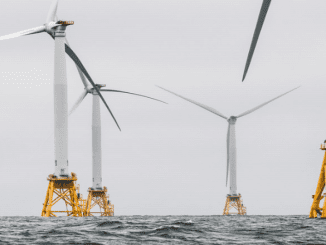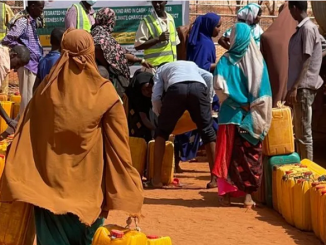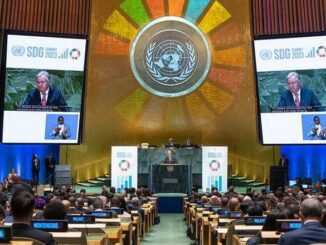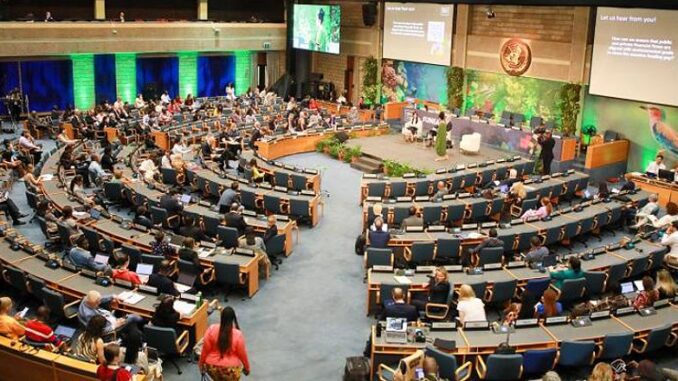
NAIROBI, Kenya, March 1, 2024 (ENS) – On the final day of the sixth session of the UN Environment Assembly, UNEA-6, there was a supercharged mood on the UNEP campus, only hours after delegates left the venue feeling deflated after work on draft resolutions was not finalized as scheduled earlier in the week.
Every two years, all 193 UN Member States meet to address urgent environmental issues. This year, the Assembly opened on February 26 and concludes today at the UN Environment Programme’s headquarters in Nairobi.
Conceived in 2012 as what the UN calls “a world parliament on the environment,” UNEA meetings aim to define priorities for environmental policies and develop international legislation.
The 2024 United Nations Environment Assembly, or UNEA-6, attracted more than 7,000 delegates from 182 UN Member States and more than 170 ministers, as well as activists, experts, and industry representatives.
In contrast to the elegant setting of the UNEP headquarters office, delegates crowded the cramped, hot rooftop conference rooms today in a rush to finalize resolutions that could answer the calls for climate action heard from dignitaries such as UN Secretary-General Antonio Guterres.
In a heartfelt video address to the conference Thursday, Guterres told UNEA-6 delegates, “Your efforts are urgent. Our planet is on the brink. Ecosystems are collapsing. Our climate is imploding. And humanity is to blame.”
“The fallout, from poisoned rivers to rising seas, harms us all. Yet those least responsible suffer most – a burning injustice,” Guterres mourned.
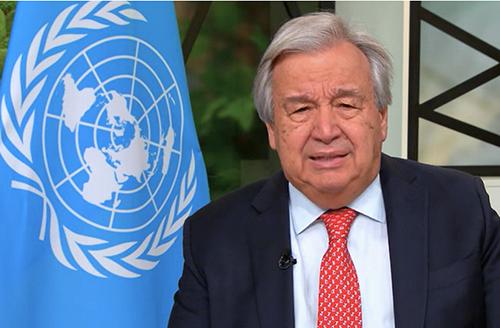
“We must work together to combat these crises – recognising the links between them – to put the world on a sustainable path, and turbocharge sustainable development.”
Guterres urged progress toward achieving the targets in the Kunming-Montreal Global Biodiversity Framework.
He encouraged countries to capitalize the new Loss and Damage Fund agreed in 2022 to provide financial assistance to climate-vulnerable countries. The fund was officially operationalized at COP28 in November 2023 with US$700 million, considered to be a small amount compared to the needs of vulnerable countries.
The UN leader said countries “must create new, economy-wide Nationally Determined Contributions by 2025, that align with limiting global temperature rise to 1.5 degrees Celsius.”
He said national governments should set their targets for the Global Biodiversity Framework; mobilize the Loss and Damage Fund; deliver a new treaty on plastic pollution; and come up with the Sustainable Development Goals Stimulus of at least US$500 billion every year, that the UN leader proposed last fall.
Guterres wants to ensure that “production and trade of those minerals critical to the renewables revolution is sustainable and provides maximum benefit to developing countries,” and assured delegates that the UN Panel on Critical Energy Transition Minerals would support these efforts.
“There are many important resolutions before you. So, please, take this chance to drive multilateral solutions,” Guterres concluded. “Let’s see that Nairobi spirit deliver once again.”
Kenya’s President William Ruto spotlighted the first Africa Climate Summit convened in 2023 and set a new vision for climate-positive economic growth and development.
The Africa Climate Summit called for reform of the global financial architecture, and President Ruto observed that many African and other developing countries pay up to five times as much as others for their debt.
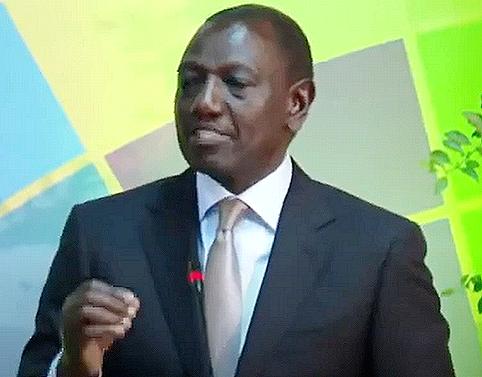
He asked the United Nations to increase its financing to solve environmental challenges, telling the delegates, “I note with concern that financing from the UN regular budget and voluntary funds remain
insufficient for UNEP to effectively deliver.”
“I therefore urge the UN General Assembly to secure new substantial and reliable funding from its regular budget to provide consistent and sustainable support for UNEP’s crucial work. Additionally, I appeal to donors to increase their voluntary contributions recognizing the urgent and vast scope of current environmental challenges,” President Ruto said.
Ruto highlighted how Kenya has banned single-use plastics already, and the government is prioritizing a circular economy in its waste management practices.
“We have six years left to deliver on the UN 2030 agenda for sustainable development. Unless we collectively undertake radical positive action we are on course to fail. The obligation falls on each one of us to clearly identify their role in order to define our contribution to this collective endeavor. Each of us must challenge ourselves and one another to unleash and harness our collective creativity and solidarity. May the decisions and the discussions and engagements in these sessions mark a significant leap forward in this vital goal,” President Ruto said.
African Presidents, Prime Ministers Urge Action Now
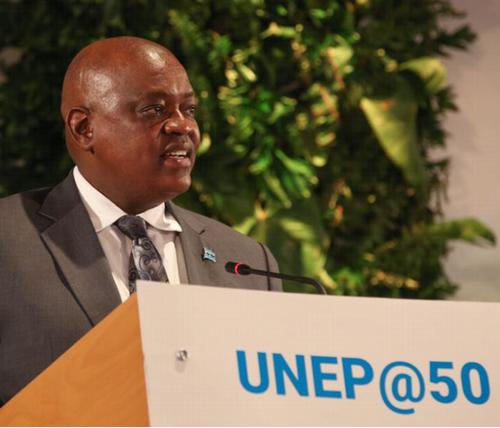
Mokgweetsi Eric Keabetswe Masisi, President, Botswana, highlighted efforts to transition from coal-fired power plants to renewable energy, with a goal to increase renewables from 2 percent to 30 percent by 2030. He also: noted efforts to develop a waste management value chain road map to contribute to a circular economy; encouraged the private sector to play its part in supporting water and sanitation targets in Africa; and called for support for land-locked developing countries.
Ismail Omar Guelleh, President, Djibouti, underlined that inactivity in the face of the triple planetary crisis is not an option as it destroys multilateralism. He described some of his country’s efforts in this vein, including increased investment in solar, wind and geothermal energy projects, the launch of the Ethiopia-Djibouti electricity interconnection project, and the establishment of multiple protected areas.
Brice Clotaire Oligui Nguema, President of the Transition, Head of State, Gabon, described his country’s environmental protection achievements, such as 88 percent forest cover and protection of 20 percent of the maritime territory. He called for greater justice in global environmental governance, urging for the creation of preconditions for economic valuation of natural capital.
Hassan Sheikh Mohamud, President, Somalia, reported that his country is banning plastic bags this year. He called for action on climate financing, stressing that the international financial climate architecture is not fit for purpose.
Musa Al Koni, Vice President of the Presidential Council, Libya, noted efforts to strengthen investments in technology and capacity building for water management. He called for proper resourcing of the Loss and Damage Fund.
Kembo Mohadi, Second Vice-President, Zimbabwe, described his country’s environmental protection measures, including adoption of a national climate change response strategy, creation of a network of national parks and protected areas, and the implementation of a community-based conservation programme. He invited all participants to the 15th Meeting of the Conference of the Contracting Parties to the Ramsar Convention on Wetlands, to be hosted by his country in July 2025.
Gervais Ndirakobuca, Prime Minister, Burundi, recalled his country’s vision of becoming an emerging country by 2040 and a developed country by 2060. He described Burundi’s fight against plastic pollution, such as through the 2018 ban on plastic bags and other plastic packaging.
Russell Mmiso Dlamini, Prime Minister, Eswatini, noted national efforts to increase the percentage of areas under conservation. He said that his country looks forward to the full implementation of the Global Biodiversity Framework Fund, and welcomed the restructuring of the Global Environment Facility.
Edouard Ngirente, Prime Minister, Rwanda, stressed the importance of the multilateral system for overcoming environmental and other shocks. He highlighted the role of the High Ambition Coalition to End Plastic Pollution in the plastics treaty negotiations, called for targets to reduce plastics, and supported developing a fund to support implementation.
High-Level Meetings at UNEA-6
During the Assembly’s High-level Segment, UNEA-6 President Leila Benali emphasized that the world is fast approaching the point of no return and called for strengthening environmental multilateralism to deliver critical solutions.
Benali, who serves as Minister of Energy Transition and Sustainable Development of Morocco, stressed the need for coordinated efforts among the UN system and public and private sectors, increased investment in research and development, and sustainable engagement with local communities.
Benali emphasized the need for “do” tanks as well as “think” tanks. She also applauded UNEP’s efforts to consider how to foster synergies among Multilateral Environmental Agreements.
Finally, Benali announced her intention to establish an alliance of goodwill environmentalists.
President of the UN General Assembly, Dennis Francis, Permanent Representative of Trinidad and Tobago to the United Nations, called for unity of purpose to achieve the UN 2030 Agenda for Sustainable Development.
Francis emphasized that the UNEA-6 outcome must contribute to: the human right to a clean, healthy and sustainable environment; multilateral responses to restore balance with nature; and a future that is more equitable, inclusive and resilient for everyone.
Paula Narvaez, Chile’s ambassador to the UN, also serves as president of the UN Economic and Social Council. She told the delegates that she regrets that the pace of progress is insufficient to meet all Sustainable Development Goals by 2030. She stressed the need for coordinated and integrated approaches to implement the SDGs, noting co-benefits for implementing health and agricultural targets will off-set the costs and boost gross domestic product.
UNEP Executive Director Inger Andersen encouraged the delegates to show solidarity and unity in the battle against planetary threats. “We, this global family, must stand shoulder-to-shoulder and push back, as one, against the triple planetary crisis to create space for the climate to stabilize, nature to recover and pollution to recede, in so doing providing the basis for economies and societies to flourish sustainably,” she said.
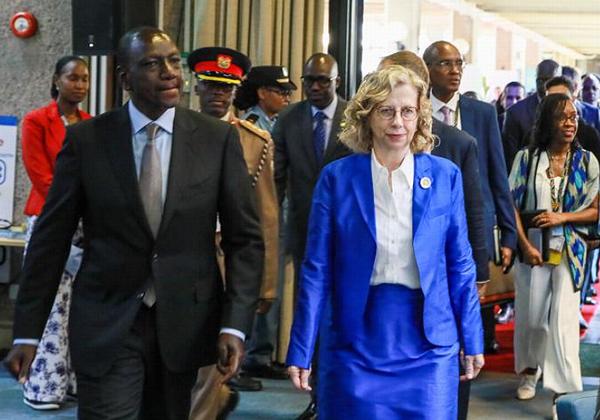
“We are here because the environmental crises facing the world are spreading and intensifying. We are living in an age of climate emergency; the warning lights on the planetary dashboard are glowing red hot. We are living in an age of withering nature, dying lands and vanishing species. We are living in an age of a planet and people poisoned by chemicals, by plastic, by waste and pollution of all kinds. Our high-carbon, resource-hungry growth has sent some planetary systems teetering to the edge of tipping points. Once these systems fall, they may never rise again. And humanity might also find itself floored,” Andersen warned.
“But we cannot and must not despair. Because the power to change lies with us. With you. With the members of this Assembly, the governments they represent and all who make up the wider UNEA and UNEP family – from Multilateral Environmental Agreements to scientists, from civil society to youth, from Indigenous Peoples to the businesses and financiers who know they must do things differently,” said Andersen.
“We must push back against this crisis in lockstep to create space for those who follow, in so doing creating intergenerational equity and helping youth to grow stronger and wiser than those whose who went before,” Andersen said.
Director-General of the World Health Organization, Tedros Adhanom Ghebreyesus, said if the planet were a patient, it would be admitted into intensive care as its vital signs are alarming. It has a fever,” Dr. Tedros said, “much of its lifeblood – its water resources – are contaminated, and its condition is deteriorating.”
Dr. Tedros highlighted the impacts of this dire situation on human health, such as increased cardiovascular and respiratory diseases, and called for the agreement on ending plastic pollution to strongly reflect the health impacts of waste plastics.
Three concerns: the role of innovative partnerships and collaboration, incorporation of Indigenous Peoples’ knowledge into solutions, and provision of adequate financing, were brought up by many representatives of major groups.
Informal Consultations Made Progress
In the morning, following approval by the Committee of the Whole, informal consultations were facilitated on draft resolutions under:
- – Cluster A on highly hazardous pesticides;
- – Cluster B on land degradation, on strengthening ocean and seas governance, and on strengthening water policies;
- – Cluster C on multilateral actions toward climate justice; and
- – Cluster D on environmental assistance and recovery in areas affected by armed conflict.
By early evening, some progress was made and draft resolutions on highly hazardous pesticides and water policies were agreed informally.
Andersen, UNEP’s executive director, told the weary delegates, “UNEA-6 takes place as environmental crises are spreading and intensifying globally. We know we have to do more. But as I said today, we cannot despair. We have the solutions. We must stand united and act. Billions are depending on us. We cannot let them down.”
Featured image: The 2024 United Nations Environment Assembly, or UNEA-6, attracted more than 7,000 delegates from 182 UN Member States and more than 170 ministers, as well as activists, experts, and industry representatives.

